The spying game: Tinker, Tailor, Soldier, Spy
John le Carré's masterpiece, adapted for the BBC in 1979, is a perfect snapshot of Britain in decline, managing its post-imperial malaise in a changing world
BBC4, that treasure trove of televisual gems, is currently showing Tinker, Tailor, Soldier, Spy, the 1979 adaptation of John le Carré’s dazzling and enthralling espionage classic. The novel was written in 1974, and displayed the author’s mastery of the genre: he had already penned Call For the Dead (1961), The Spy Who Came In From The Cold (1963) and The Looking-Glass War (1965); but in many ways, Tinker, Tailor, and its sequels The Honourable Schoolboy (1977) and Smiley’s People (1979), were the summit of his achievement, the apotheosis of his unlikely hero George Smiley, and the most complete portrayal of the clash between West and East, the ideological differences between the two great power blocs and the gritty, grim atmosphere of spying at the height of the Cold War.
Tinker, Tailor is dominated by the hunt for a mole, a double agent, near the top of the Secret Intelligence Service (SIS), known in le Carré’s world as “the Circus” because its headquarters are located at Cambridge Circus (though the double meaning is obvious and intentional). In fact, at this point, SIS was based at Century House, 100 Westminster Bridge Road, moving to its current Vauxhall Cross citadel in 1994. The air of decline and decay is set from the beginning: Smiley has been forced into retirement after the disaster of Operation Testify, a botched exfiltration in Czechoslovakia which resulted in the capture and torture of a senior SIS officer, Jim Prideaux. The aftermath of Testify brought down Control, the head of the service, whose deputy and “chamberlain” Smiley had been, and the dourly ambitious Percy Alleline has been installed as chief.
Before his fall (and swiftly subsequent death), Control had concluded that there was a mole within the Circus, and had employed Prideaux to identify the traitor. He had narrowed it down to one of four senior staff: Bill Haydon, Toby Esterhase, Roy Bland and Alleline himself. This was a time of suspicion and unease. Still livid in the folk memory of the intelligence agencies, raw like an unhealing wound, was the unfolding betrayal of the Cambridge spies. Donald Maclean and Guy Burgess, prominent SIS officers, had disappeared in 1951, revealing themselves at a press conference in Moscow five years later; Kim Philby, once SIS head of station in Washington DC, defected to the Soviet Union in 1963; and the following year, Sir Anthony Blunt, surveyor of the Queen’s Pictures, was unmasked privately as a former Soviet agent. Blunt no longer had access to secret information, so was granted immunity from prosecution in exchange for a full confession, and his treachery was not made public until 1979, but his status was well known within intelligence circles. Also in 1964, John Cairncross, who had served at Bletchley Park, in the Foreign Office and at SIS, admitted to passing secrets to the Soviet Union.
By the time of Tinker, Tailor, therefore, there was a trope of highly placed traitors within the British intelligence community. No-one was above suspicion, and there had been rumours that even Sir Roger Hollis, director-general of MI5, had been a mole. (This is now generally thought to have been false.) So le Carré’s portrayal of treachery in the senior leadership of SIS seemed wholly plausible. If Hollis could be regarded as a suspect, why not Alleline, the chief of SIS, or one of his key lieutenants?
George Smiley is summoned back to the Circus to resume the hunt for the mole. He is taken by his former protégé, Peter Guillam, to see Sir Oliver Lacon, the shadowy Cabinet Office civil servant who oversees the intelligence apparatus. Smiley is to work secretly with a small team to identify the traitor. The work is exhausting, painstaking and laborious, ideally suited to his methodical, academic nature, and Smiley is the perfect “hero” for the tired, shabby 1970s. He is physically unimpressive, short, overweight and balding, his clothes shabby and ill-fitting. He wears thick spectacles, and is so unmemorable he can disappear into crowds. So he is the antithesis of Ian Fleming’s James Bond, owing nothing to 007’s glamorous lifestyle and action-packed adventures; but he does not even have the presence of Len Deighton’s nameless narrator of The IPCRESS File (christened “Harry Palmer” in the iconic film adaptation) or le Carré’s own melancholy, doomed Alec Leamas.
The casting of Tinker, Tailor is an exercise in inspiration and genius. Alec Guinness, by then a veteran of the stage and screen, and recovering from the novelty of appearing in Star Wars (1977), had never acted for television before and was deeply uncertain about his suitability for the role. Le Carré (whose real name was David Cornwell) arranged to take him to lunch with Sir Maurice Oldfield, the real recently retired chief of the Secret Intelligence Service. Oldfield, passed over when Sir Dick White had retired as C in 1968, eventually succeeded Sir John Rennie in 1973, and served as chief for five years. (His deputy was Brian Stewart, father of Conservative MP and cabinet minister—and perhaps SIS officer—Rory Stewart.)
Guinness was captivated by Oldfield, who was something of a proto-Smiley, unremarkable, heavy and academic by nature, and they talked for hours over lunch. Guinness particularly noted Oldfield’s habit of running a finger round the rim of his wine glass, and wondered if the retired spook was checking for poison; in fact Oldfield was just making sure the glass was clean. But the encounter was enough to convince Guinness to sign on for the production, and his performance is the fulcrum of the series, the sun around whom all the planets and satellites revolve.
Also superb is Ian Richardson as Bill Haydon, the flamboyant, charming head of London Station, in charge of all overseas operations. Haydon is a man who seems incapable of taking anything seriously; he is well connected, talented and popular, modelled at least in part on Kim Philby. He is eventually revealed to be the mole, and his motivation includes the decline of the United Kingdom’s status in the world and the inevitable subservience to the United States, which Haydon comes to loathe. This was Richardson’s first major television role, as he had previously been principally a stage actor and regarded as a Shakespearean specialist. This stage presence served him well portraying Haydon, a man whose life is essentially a performance, and although in his mid-40s, his vulpine features and well-spoken charm made him a convincing and seductive anti-hero. In some ways, Haydon shares a spirit with Richardson’s later performance as political schemer Francis Urquhart in House of Cards (1990): both have the ease and self-assurance of the upper class and a burning fire of ambition which is at first not obvious.
Richardson perhaps shines most brightly in the denouement of the series, after Haydon is caught and detained as the mole. You can see his personality begin to collapse, his mind almost unable to compute that his adventure is at an end and his life most likely forfeit. On the surface he remains calm and light-hearted, but confides to Smiley that he has been prone to bouts of weeping. His emotions are merging into one another as his self-control vanishes.
“What do you want to know?” Haydon asks.
“Oh, why? How? When?”
“Why? You ask that? Because it was necessary, that’s why! Someone had to!”
Haydon pauses.
“We were bluffed, George. You, me, even Control. Those Circus talent spotters, all those years ago. They plucked us when we were golden with hope, told us we were on our way to the Holy Grail... freedom’s protectors!” He is weeping now. “My God, what a question! ‘Why?’”
There should be at least an honourable mention for Michael Jayston as Peter Guillam. Jayston had enjoyed a solid career on stage and television before Tinker, Tailor, and was 44 when the series was screened: his character is in some ways both the straight man and the thread running through the whole narrative. Guillam has been marginalised in the wake of Control’s fall, sent to Brixton to head up the Circus’s “scalphunters”, the officers who carry out tasks requiring force and, sometimes, violence. But he is used by Lacon as an emissary to Smiley, and by Smiley as a spy on the Circus leadership. And it is Guillam for whom Ricki Tarr, the man who supplies vital information in the mole hunt, has worked as a scalphunter. Guillam’s character is also important because it is, as the author admitted to Jayston during filming, the closest le Carré came to creating a self-portrait.
Jayston’s performance is controlled but potent. He has the core of menace and violence of a man who has seen the rough side of espionage and knows the secrets of the more shadowy fringes. But he is also human and, in his own way, moral, motivated by a strong sense of right and wrong, and of loyalty to Smiley and the institution of the Cirus, as well as to the pursuit of the mole. Guillam can seem dour, but it is an attitude sometimes ameliorated by a wry sense of humour.
Perhaps the most striking performance, certainly in terms of impact compared to screen time, is Beryl Reid as Connie Sachs, once head of research at the Circus but put out to pasture when the old order is swept away. She adores the service and the young heroes she once knew, and has an encyclopaedic recollection of people, places and events. Smiley visits Sachs in Oxford to consult the contents of her memory, and she greets him with delight as a beloved friend—she had wished he had been more—from the old days.
“You’re my gorgeous George,” she tells Smiley. But her good humour is a thin veneer. She has been devastated by her dismissal from the Circus, and remains both angry and heartbroken.
I was the best head of research the Circus ever had. Everyone knew that. And what did they say the day they gave me the chop? That personnel cow: ‘You’re losing your sense of proportion, Connie. It’s time you got out into the real world.’ Well, I… I hate the real world! I like the Circus and my lovely boys!
Reid’s abject despair shows us the effect that her exile has had on her. The service was her world. It was familiar and comforting and an arena in which she excelled. But time has moved on and she became surplus to requirements. Smiley draws out of her the information he needs, but she remains maudlin, a symbol of the past, the waning power of Britain and its intelligence agencies, a relic of the days of empire. There is a flicker of triumph as she asks if she has been vindicated.
“Did I start the landslide, George?”
“You were always dead right, Connie.”
“And is George now picking up the pieces?”
“Something of the sort.”
“Poor loves. Trained to Empire. Trained to rule the waves. Englishmen could be proud then. They could, George. All gone. Taken away. Bye-bye, world.”
It could be the summation of the whole series, and the epitaph for a lost Britain. Every certainty by which Connie has lived, every beam of the structure of her professional and personal life, has been taken away, and she cannot bear it. She is left now only with memories, and, she realises, illusions, if she wants them. As Smiley leaves, she gives him one last instruction, and for me it is the most devastating, emotionally charged line of all, crisp and sharp and poignant and all-encompassing.
“If it’s bad, George… don’t come back. Promise? I want to remember you just as you were. My lovely, lovely boys. Promise?”
If that doesn’t choke your throat and make tears prickle in your eyes, you have no soul. You know it will be bad. You know George will not return. He doesn’t need to promise.
It is an absolutely titanic performance by Reid. But it was very far from inevitable: she was known mainly for light comedy at the time, recent projects including Carry On Emmannuelle, No Sex Please, We’re British and Father, Dear Father. Guinness at first resisted her casting—once he accepted the role of Smiley, his eminence meant he had huge influence over the selection of actors and actresses—but was won over and came to regard her as one of the best performers in the series. And he was right. She is on screen for perhaps five minutes or so, but she is essential to the narrative arc. Reid gives her eccentricity, brilliance and desperate pathos: she is a woman ruined by drink and unable to escape her memories.
Tinker, Tailor is a kind of series that couldn’t, and wouldn’t, be made today. In this era of deep pockets at Netflix and Amazon, its length—seven episodes—is not remarkable, but it is the pace which is so different. Some complained that the plot crawls along and not enough happens; for me, though, and for many, the stately progress it makes it a benefit, a fine distinguishing characteristic. After all, espionage in the real world is not all Bondian car chases and frantic rooftop pursuits: it is slow, painstaking, arduous work, as Smiley knows all too well. The television series matches that kind of progress, as well as keeping an air of mystery and doubt about the eventual truth of the story.
I could write a whole volume on the characters and their portrayals, but the other aspect I want to touch on is the atmosphere, the milieu in which the television adaptation—and its source material—takes place. The 1970s were a grey, or perhaps beige, time for Britain. The economy was slowing, especially with the pressure of the oil shortages after 1973, and, to emphasise the state of crisis, the 20-year consensus on the essential framework of the economic system, the Butskellite consensus of the 1950s and 1960s which balanced gentle growth against a pressing priority of full employment, was beginning to fall apart. The humiliation of Suez was now approaching 20 years in the past, but still rankled: it had been the great foreign policy cold shower, as the British political community realised suddenly what should have been dawning for years, that the UK was no longer a top-rank power, could not act in defiance of its American allies, and no longer had the weight of an empire to boost its standing.
Since Suez, the UK had almost entirely decolonised. India, of course, had been the first jewel to fall, the largest, finest and most admired, most necessary to the prestige of the Empire. That had been 1947. But in the two decades which followed, the UK had released most of her Africa possessions, mostly by recognition of the inevitable but occasionally bowing to pressure and violence; by the end of the 1960s, all that remained in the once-“dark” continent was the Seychelles, although Southern Rhodesia, which had declared independence unilaterally, remained a rogue state fighting an increasingly dirty war against its own majority population. Britain still had its two military footholds in Cyprus, at Akrotiri and Dhekelia, as well as Hong Kong and the Falkland Islands. Denis Healey’s ambition as defence secretary from 1964 to 1970 to withdraw military personnel from “east of Suez” was all but complete, save for Hong Kong.
It is pretty much mandatory in this kind of discourse the cite former US secretary of state Dean Acheson. He had run the State Department under President Harry Truman from 1949 to 1953, then had returned to his legal practice while Dwight Eisenhower was president, out of favour with the newly Republican White House. Addressing a cadets at West Point in December 1962 on the subject “Our Atlantic alliance: the political and economic strands”, he observed, famously and almost axiomatically, the Britain had lost an empire and not yet found a role. Indeed, he went on:
Britain's attempt to play a separate power role—that is, a role apart from Europe, a role based on a 'special relationship' with the United States, a role based on being the head of a Commonwealth which has no political structure or unity or strength and enjoys a fragile and precarious economic relationship—this role is about played out. Great Britain, attempting to be a broker between the United States and Russia, has seemed to conduct policy as weak as its military power.
The words stung, not least because of the heavy dose of truth they contained. The Daily Express called the speech “a stab in the back”, while The Daily Telegraph studiously avoided the moral high ground and went for a low but amusing blow, describing Acheson as “more immaculate in dress than in judgment”. The prime minister, Harold Macmillan, gave a characteristically languid but scalpel-sharp reaction. The former secretary of state had made:
… an error which had been made by quite a lot of people in the last 400 years, including Philip of Spain, Louis XIV, Napoleon, the Kaiser and Hitler.
Ouch. Mack the Knife indeed. It is ironic to reflect that Macmillan had an American mother, while Acheson’s father was British.
Bill Haydon, however, agreed wholly with Acheson’s assessment. Although he was a stereotypical product of English society, and admits to Smiley in captivity that he “hate[s] America very deeply”, he sees the weakened position in which the United Kingdom finds itself by the 1970s.
Do you know what’s killing western democracy, George? Greed... and constipation... moral, political, ascetic... The economic repression of the masses, institutionalised. Even Lenin couldn’t foresee the extent of that. Britain... ah dear… no viability whatever in world affairs.
This is the malaise which seeps through Tinker, Tailor. Britain is purposeless and jaded. It is reflected in the Circus personnel. We saw earlier Connie Sachs’s lament that “her boys” had been “trained to Empire. Trained to rule the waves”. And the secret world of the Circus still resonates faintly with the language of empire, too. Guillam explains the restructuring of SIS to Smiley with reference to the previous division by geographical area. “Each region was commanded by its own ju-ju man with Control in heaven pulling the strings,” he reminds the older man. The phrase “ju-ju man” is also used by Jim Prideaux, victim of Operation Testify. It is a west African term (from the French joujou, “plaything”) and means a religion or system of belief involving objects and spells.
This stiff, old-fashioned, colonial-influenced attitude pervades Tinker, Tailor. Smiley says early on of Control that “he hated everywhere, except Surrey, the Circus and Lord’s cricket ground”, while his dinner companion on that occasion, the appalling Roddy Martindale (played to perfection by Nigel Stock) has the full set of snobbish prejudices. As they run through the senior leadership of the Circus, Martindale, a Foreign Office functionary of great dignity but little influence, sneers at the background of Roy Bland, Haydon’s deputy and head of Eastern Bloc operations, a working-class Oxford economist.
“The shop-soiled white hope, the first redbrick don to make the Circus.,” Martindale says with malice.
Smiley has had a trying evening and his patience snaps. “You featherhead, Martindale! You pompous, bogus, gossiping old featherhead! Roy Bland is not redbrick. He was at St Antony’s College, Oxford.”
But the gradations of British snobbery have an answer ready. “Oh, don’t be silly, dear,” Martindale replies calmly, “St Antony’s is redbrick. Makes no difference there’s a bit of sandstone in the same street.”
(It is a rather harsh judgement. Although St Antony’s, founded in 1950, was a toddler in academic terms when Tinker, Tailor was written then adapted, it already numbered among its graduates Yigal Allon, Israeli foreign minister 1973-77, Jean Blondel, founder of the European Consortium for Political Research, and David Marquand, MP for Ashfield and a leading academic. But this eminence would not have mattered to Roddy.)
If Tinker, Tailor reflects a Britain still clinging to the tattered remnants of its past, lacking a purpose or, as Acheson said, a “role”, it is interesting that there are two subjects which are absent from the narrative, yet both were major political issues in the United Kingdom of the 1970s. The first is Europe: the novel was written in the very aftermath of our accession to the European Economic Community (and indeed Acheson called the UK’s first application for membership “a decisive turning point”, and said that if we joined the EEC, “another step forward of vast importance will have been taken”). Although our foreign and defence policy remained very much focused on NATO, it is peculiar that our newly enhanced relationship with our European neighbours does not get a look in.
The other issue on which le Carré is silent is Northern Ireland. Of course, the Troubles were officially a domestic matter, and therefore within the purview of MI5 (for whom the author had also worked), SIS had taken a veiled interest from an early stage; in 1973, Michael Oatley, an SIS officer, had been appointed assistant political adviser to the Northern Ireland secretary, William Whitelaw, a meaningless post which simply acted as cover for his representation of the intelligence service. The conflict in Northern Ireland mattered to SIS, not just because of their duties towards the defence of the state, but because it represented a genuine shooting war in which there was the availability of excitement, danger and success, perhaps more pulse-quickening than the icy Cold War against the Warsaw Pact. In 1979, indeed—the year in which Tinker, Tailor was broadcast—Sir Maurice Oldfield, the former chief of SIS whom le Carré had introduced to Alec Guinness, was appointed security co-ordinator in Northern Ireland in order to bring together the different agencies and organisations contributing to security in the Province. Yet one could read le Carré’s book or watch the television series and remain entirely ignorant that Northern Ireland was the most immediate security and intelligence challenge facing the government of the time, where around 20,000 regular soldiers were deployed at any one time.
Perhaps these contemporary themes did not suit le Carré and he wanted to focus on the nostalgia and elegy of Tinker, Tailor. For all that Ricki Tarr says the story is “all about spies”, it is surely more about human relationships and the changes which time wreaks on them, about shifting loyalties and the evolution of the nation state which is the focus of loyalty for so many. That makes the Soviet threat, with its reminders of the perfidy of Burgess, Maclean, Philby et al, and the echoes of the wide imperial world which SIS had once had to defend, more suitable influences for the narrative.
This has been a very partial, selective and inadequate study. Tinker, Tailor, Soldier, Spy is not just a great espionage novel and television series; it is one of the great novels of post-war British literature and broadcasting, and it deserves to be seen on that scale. But it is an intricate tapestry as well as a broad canvas, and I’ve tried to pick out some issues of special interest and depth. I have said nothing of Hywel Bennett and the complex back story of Ricki Tarr, Boris and Irina; of the shadowy figure of Lady Ann Smiley, wife of George, cousin and lover of Bill Haydon (though hardly unique in that latter context; love to Ann! Everyone’s love to Ann!); or of the ambitions and achievements of the grim and humourless Percy Alleline, lowland Scot, son of the manse and Cambridge graduate of whom Control notes “Percy Alleline would sell his mother for a knighthood and this service for a seat in the House of Lords”. Perhaps I can return to le Carré’s masterpiece another time and mine it again.
If you haven’t, by some freak of nature, read or seen Tinker, Tailor, or perhaps have only seen the 2011 film version directed by Tomas Alfredson (good, with some fine performances and excellent period character, but a faint, truncated echo of the series), I urge you to take the time and enjoy both. The book should be on anyone’s shelves, really, and the series is currently available on the BBC’s heaven-sent iPlayer. I hope and expect you won’t regret the investment of time. And you might just find a new passion. Remember: there are three of them, and Alleline.


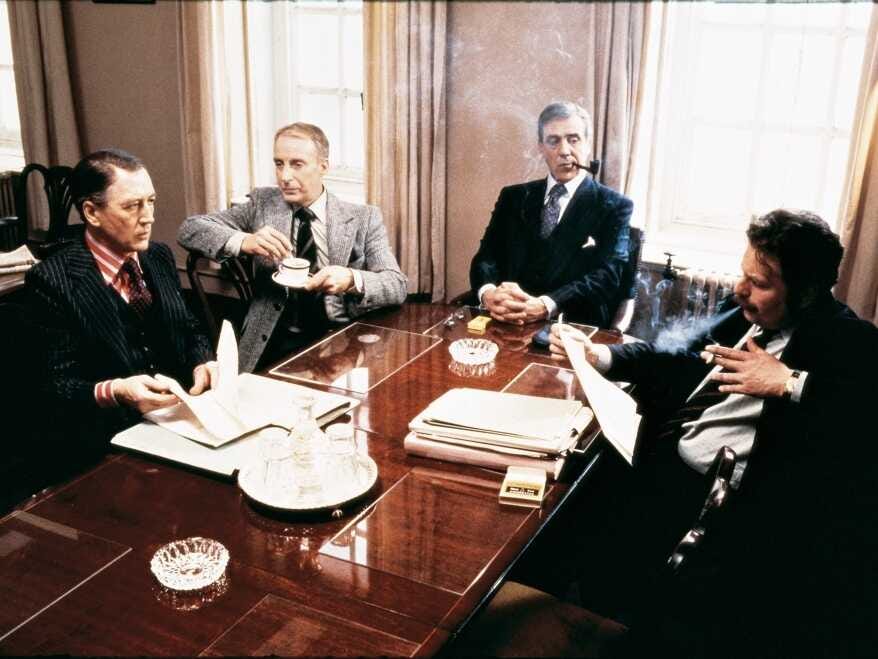



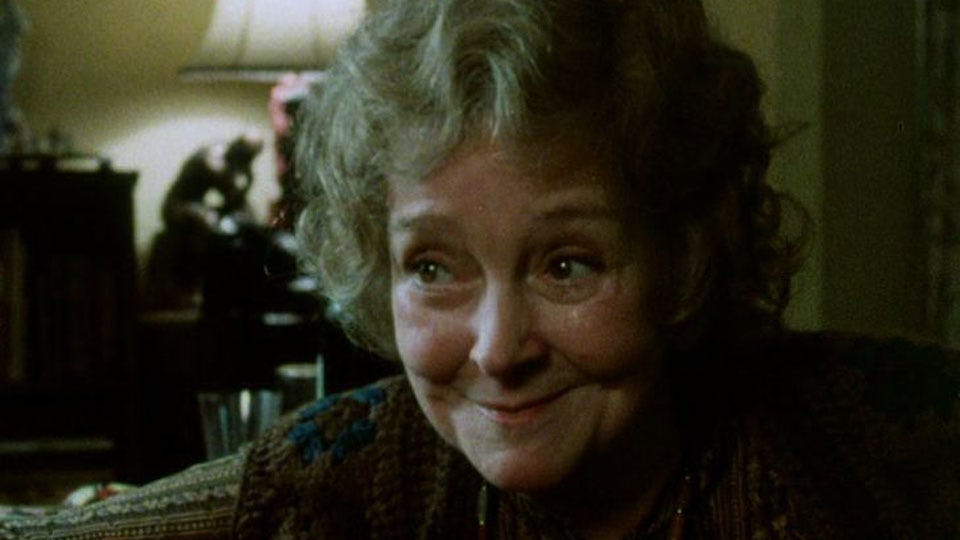
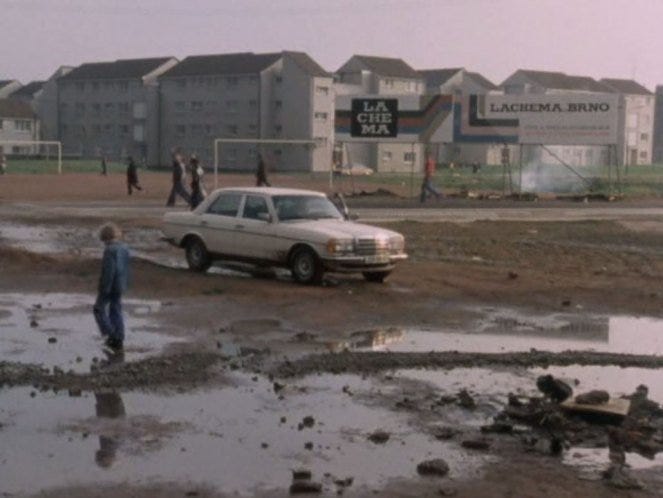

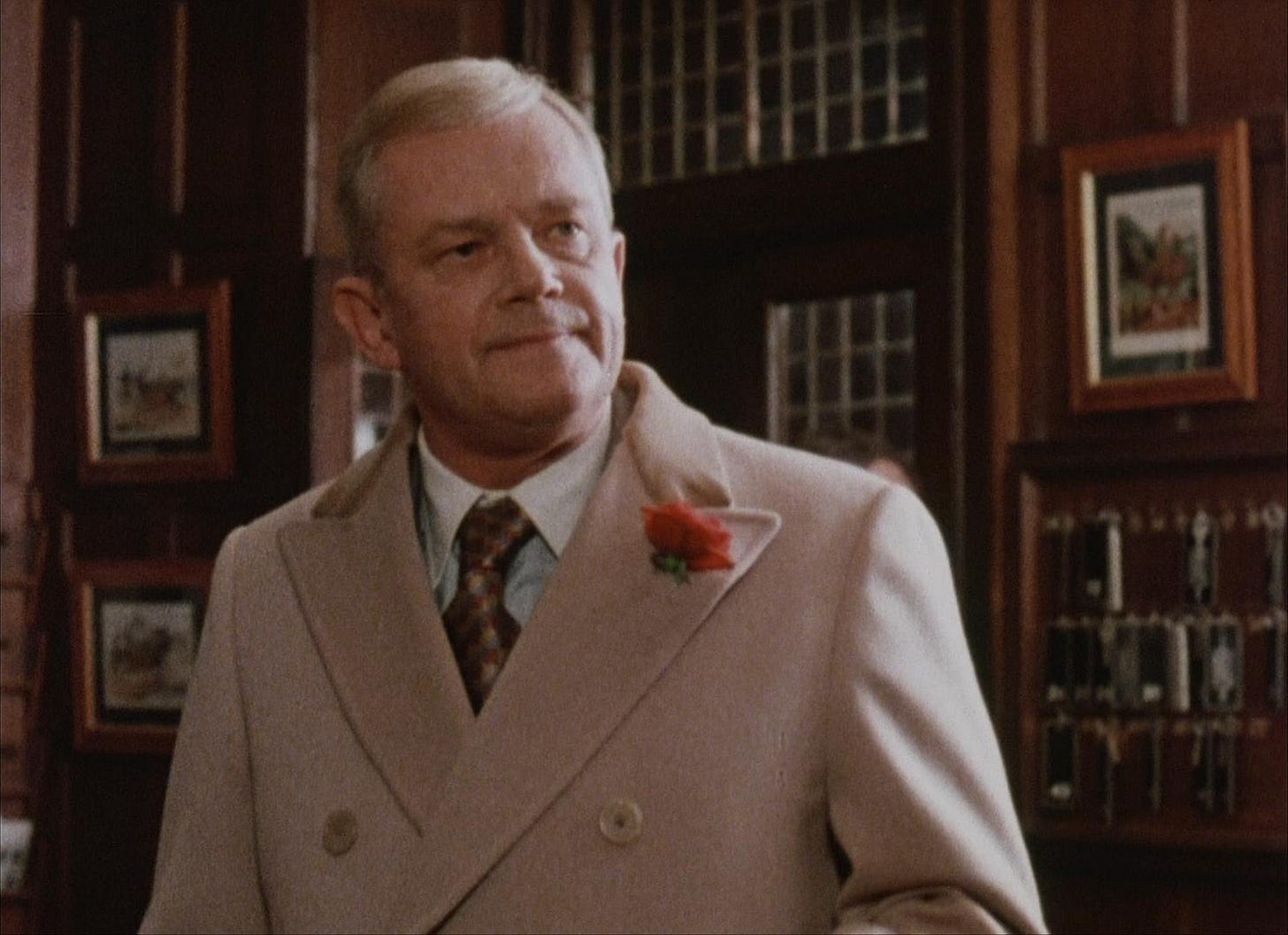
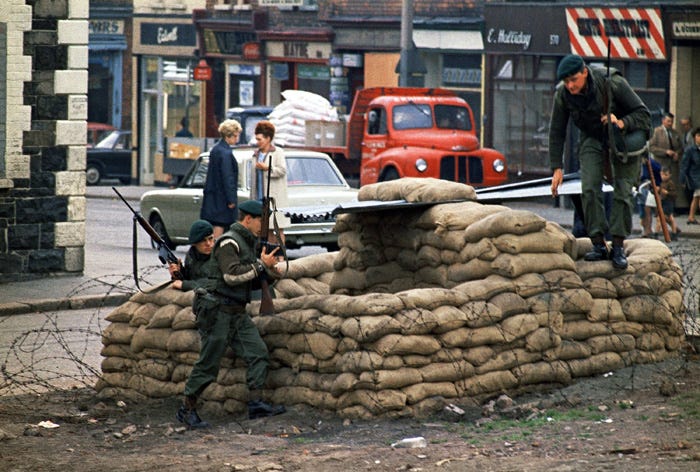
It’s one of the greatest TV programmes ever made. Would love to read more of what you have to say about other characters, so please do another post! It’s hard to find fault with anyone in this cast. I particularly liked Bernard Hepton as the trying much too hard outsider, Esterhase and Joss Ackland puts in a marvellously messy, sweaty turn as Jerry Westerby. You can smell the alcohol and curry fumes just watching him. Geoffrey Burgon’s arrangement of Nunc dimmittis at the end is perfect too, so melancholic and gets me every time. It’s peerless. Thank you for an excellent read.
Very good.
Whenever anyone asks me about “my favorite television series,” I start with this and some American television from the 50s. And I’m met with incredulity. Because the general idea is that television is supposedly so vastly superior now that anything made before 2005 or so should be inadmissible, or something like that. This relates to your point about the complaint that “not enough happens.” The common complaint would be that the series is “slowly paced.” But the storytelling is grounded in little turns of behavior (I recall the opening wordless sequence at the circus, when everyone shows up for work one by one). When I think of the series, I think of Guinness settling into his chair to adjust his glasses, urging Tarr to begin his story; Prideaux making his way through a checkpoint in Czechoslovakia; the wasted landscape you include in your excellent piece. The difference with the movie adaptation is instructive, in particular the difference between Guinness and Gary Oldman. Guinness is all nuance. Oldman, who I often admire, gives one of the hammiest and most mannered pieces of “underplaying” I’ve ever seen. But in fairness, a performance like Guinness’ would not be possible in the film, which is constructed to move swiftly and in instantly comprehensible blocks.
I think Arthur Hopcroft did a pretty remarkable job of adapting the novel. So did the director, John Irvin. That series is real filmmaking.